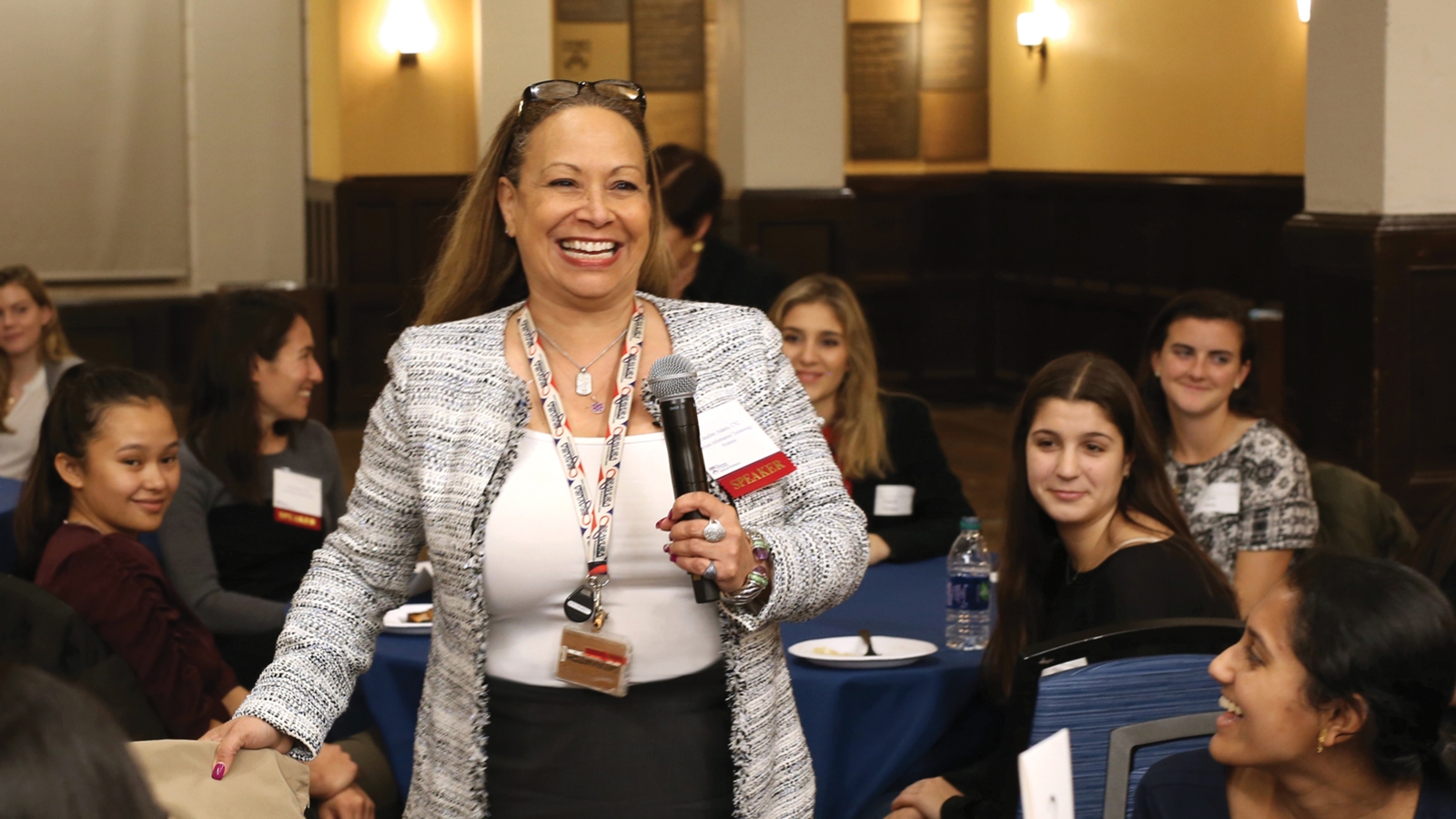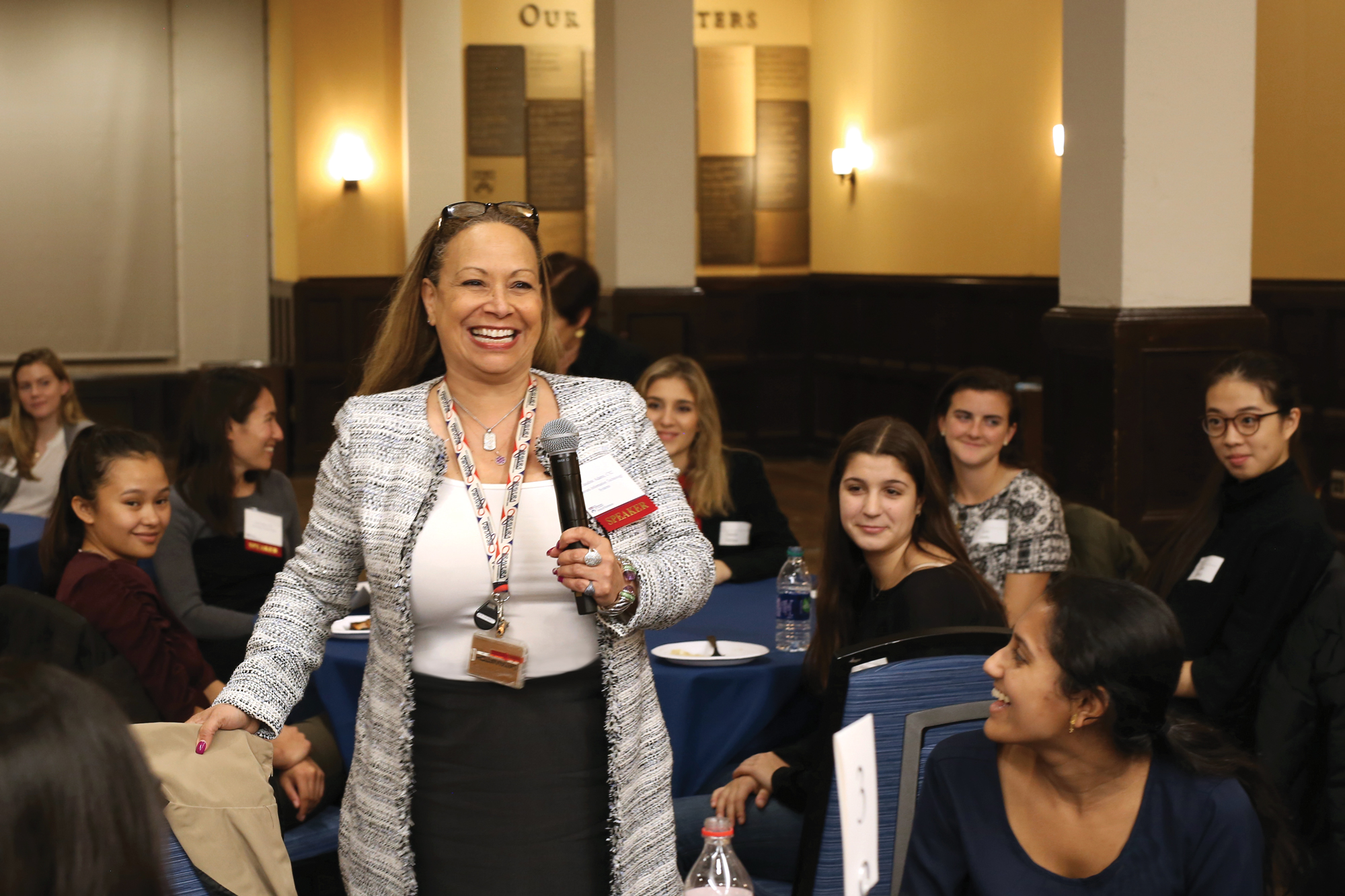On Her Own
Claudine Adams, C’82, PAR’17, left a long career at a large company to start something from scratch.

When Claudine Adams, C’82, PAR’17, started at Penn she thought she wanted to be an attorney. An Intro to Psychology course changed that, despite its challenges. “I still remember that first multiple-choice test,” she says. “I thought it would be easy, but to this day it is one of the hardest tests I’ve ever taken.” But she was hooked and declared psychology as a major, completing internships at Thomas Jefferson Hospital and the Philadelphia Child Guidance Clinic.
Here, Adams talks about her path from Intro to Psych to defense contracting.
Q: What was your post-grad career path like?
After I graduated with my psych degree, I wanted to work in the field. I worked for a psychiatric hospital and I loved it. But it’s the type of field where you really need your Ph.D. to make a career, so I had to make a decision about what I wanted to do with my life.
I saw an ad from a headhunter in the paper—there was no internet. When I called, the original job wasn’t available but there was something at Xerox. I interviewed and became a sales rep there, where I worked for 20 years.
Q: How did your role at Xerox change during your time there?
When I started as a sales rep, I sold what we called facilities management, a service where Xerox would operate a company’s mailroom and facilities. As technology expanded, multifunction devices came into play, and data centers began working with a lot more information, and my job grew a lot more technical. I worked to understand all of it. When I started, I was the sales rep for the Philadelphia area, but when I left I managed the East Coast operation from Boston down to Florida and west to Tennessee.
I was there a long time, but big companies are always changing. Just when you think you understand what’s going on, something changes. It was challenging and it kept me learning.
Q: Did you call on your psychology background when you left the field?
My training in psychology and my clinical internships have had so many benefits. Studying human behavior and communication really taught me to read people and how to listen well.
I think even to this day it gives me an advantage, because being able to listen well and to pay attention to body language or what might be troubling to clients means you can address their concerns. It really makes a big difference.
Q: What motivated you to start your own company?
I always wanted to have my own company, I just didn’t know what kind of company it would be. My husband was a software engineer and he felt the same way. We decided that we didn’t want to wait too long and if we were going to start a company, we better do it while we were a little bit younger. And so, in 2004 we incorporated an engineering firm.
The company grew, but eventually I sold myself out of it to start something solely on my own. In 2014, I started Bravura, a defense contracting firm that offers software system engineering and network operations, among other things.
Q: What are the risks of striking out on your own?
When you work for a large company, you spend a lot of time fighting internal battles in order to justify a particular business decision or to get approval for one thing or another. But the good news with the large company is you have a lot of infrastructure. There’s a whole HR department; there’s a whole legal department; there’s a whole payroll department—you don’t have to worry about that, you can focus on your job. The biggest transition for me in opening my own company was that all of a sudden I was every department.
There wasn’t anyone else to call on the phone and say, “Hey, what do I do with this situation?” Making sure that I had the right information to make good decisions as a small business owner was really key.
Q: Are there particular challenges to being a woman-owned business in the defense sector?
There’s not a whole lot of women in this business, but more are coming in than ever before. Do you still run into some of the norms, the good-old-boy networks that you have to battle? Absolutely.
The federal government has a Woman-Owned Small Business program and so they are now mandated by Congress to do a certain amount of work with women-owned businesses. But that’s relatively new. There’s still a challenge in being a woman in a man’s world, for sure.
Q: Do you have any advice for students who want to start their own businesses?
Before you strike out as an entrepreneur, work for another company for a little bit. That helped me because it taught me things that I used to open my own business. If I had started my own business straight out of school, I wouldn’t have had the benefit of a lot of the training and experience I got working for a large company. By the time I started, I understood how HR works, how contracts work, and what types of training benefit employees.
Take the time to learn how an organization operates, learn what’s good, and learn what’s not so good and then branch out on your own.
Q: When you remember your time at Penn, what do you think about?
My favorite thing to do was walk down Locust Walk in the springtime, when the snow had melted and the vendors were coming out. I lived in the high rises, which we called the superblock back then. From there I’d walk over the bridge and head down Locust Walk. It was always a treat.




